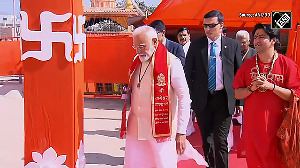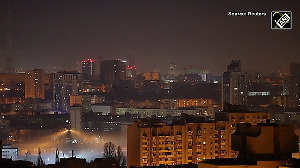Arun Jaitley, New Delhi media's most favourite analyst on days of election results, was less effusive than usual on Monday.
He was overlooking the New Delhi election where his party has lost and Sheila Dixit has won beating the anti-incumbency and overcoming her party's lack of credibility on issue of terrorism.
Jaitley was not an official in-charge, but he was in-charge of the campaign of the party. After a series of spectacular electoral victories credited to him for planning and execution of strategy from behind in Gujarat and other states the defeat in New Delhi is a set back to him at a personal level.
That goes without doubt that Sheila Dixit's image among the middle class of New Delhi has countered the impact of terrorism to a large extent. She has a soft image, she is never loud, and she keeps smiling.
She is rarely seen offensive on any burning national issue and her accommodative gestures to adversaries has helped her retain her edge in leading the party and helping it to get back to power.
In New Delhi, it was hard to ignore Dixit's efforts of development which were so-visible and impressive.
Two other issues have also helped her gain power for third time.
Mayawati' Bahujan Samaj party faced at most places weak candidates of the BJP in a triangle contest.
As a result, the BSP's presence could not be capitalised by the BJP. The BSP has cut into the Congress votes but it was not enough to defeat Congress candidates because the BJP candidates were too weak to gain out of the BSP's presence.
Second, the BJP gave tickets to all the sitting MLAs and that worked against the party.
It is not a surprise that before the list of candidates of the BJP was announced party's internal surveys were showing that it's having an edge in New Delhi.
But the downslide started after the candidates were announced.
The BJP top brass still claims that Vijay Malhotra, party's chief ministerial candidate was not at all responsible for the defeat. It's the weak selection of candidates that has cost dearly.
Since the last few weeks, after every two days, the party was conducting internal surveys to assess the mood.
After the Mumbai attack, the BJP's prospects did improve but, the party now believes that if it had done more scientific and caste-friendly selection of candidates, Dixit would have had a tough time. While giving his assessment of the election results, Arun Jaitely told rediff.com that, 'The election results are a mixed bag. Each state is a separate election."
He dubbed the New Delhi defeat as a setback.
"We should have done much better here. There was not a single issue in this election. This election was a basket of several issues."
He said there was a cocktail of issues like the constituency-specific issues, leadership issue, pro and anti-incumbency emotions and, national and state issues.
He dismissed the opinion that the terrorism issue of the BJP didn't work in elections.
He retorted back, "Can we say issue of terrorism worked in Madhya Pradesh and not in New Delhi?"
He said, "In Madhya Pradesh Chief Minister Shivraj Chauhan has done exceptionally well. He has personal credibility. He kept the party full involved. He enthused the voters. The party remained united. Shivraj is one leader who behaves like a party worker. He is very accessible."
While assessing the party's victory in Chhattisgarh, Jaitley said, "Raman Singh is CM without any controversies. He has launched some good government schemes and has been able to implement it. That helped him to defy anti-incumbency."
Jaitley thinks that the victory in Madhya Pradesh and Chhattisgarh's is the sign of success of BJP's positive plank of development."
While talking on the defeat in Rajasthan, he said that vote percentages show that the BJP is narrowly behind the Congress and CM Vasundhara Raje and party does have acceptability.
"We should have set in order our own house," says Jaitley when asked about the defeat in Rajasthan. He says that if internal problems were not there it would have helped BJP got many more seats.
When asked about the state election projections in terms of Lok Sabha elections, he said, "I am quite okay with it. Out of three big states in Hindi heartland (MP, Chhattisgarh, Rajasthan) we have won two and in Rajasthan our vote percentages are encouraging. If you translate it to the Lok Sabha, we have reasonably good situation. In New Delhi, we have seen that people vote differently in the Lok Sabha."
When asked why nationalist party like the BJP could not get more votes of Hindus in wake of Mumbai attack, he dismissed the question by asking, "Do you mean to say Hindus are pro- terror?''
On a serious note, he added that, "These days, states revenues have increased. Now, state governments have means to beat the anti-incumbency by various means. Out of five in three states, sitting CMs could repeat their performances.''
However, on a day like this when the BJP has failed to project their stance on crucial issues of security and economy in two important states of India, a subdued Jaitley took things in stride and after talking to media, the ace analyst and one of the most-sought- after lawyers of India, left for Supreme Court to argue the case of a steel company.






 © 2025
© 2025